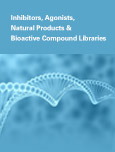Request The Product List ofBTK
BTK
Bruton's tyrosine kinase (Btk or BTK) is a kinase that plays a crucial role in B-cell development. BTK plays a crucial role in B cell maturation as well as mast cell activation through the high-affinity IgE receptor. BTK has emerged as a promising drug target for multiple diseases, particularly haematopoietic malignancies and autoimmune diseases related to B lymphocytes. Considerable progress has been made in the development of irreversible inhibitors, most of which target the SH3 pocket and the cysteine 481 residue of BTK.
Ibrutinib, a first-in-class BTK inhibitor, has demonstrated high response rates in both relapsed/refractory and treatment naïve chronic lymphocytic leukemia (CLL). However, scientists identified a structurally novel mutation (BTKT316A) in the SH2 domain, but not kinase domain, of Bruton tyrosine kinase which was associated with disease relapse.
Acalabrutinib (ACP-196) demonstrated higher biochemical and cellular selectivity than ibrutinib and spebrutinib. Acalabrutinib is a BTK inhibitor with key pharmacologic differentiators versus ibrutinib and spebrutinib and is currently being evaluated in clinical trials. More BTK inhibitors (GDC-0834, CGI-560, CGI-1746, HM-71224, CC-292, and ONO-4059, CNX-774, LFM-A13) are under inverstigation in the treatment of B-cell malignancies and autoimmune disorders.
References:
1. Winer ES, et al. Expert Opin Investig Drugs. 2012 Mar;21(3):355-61.
2. Kharfan-Dabaja MA, et al. Leukemia. 2014 Mar;28(3):507-17.
3. Aw A, et al. Drugs Aging. 2017 Jul;34(7):509-527.
4. Sharma S, et al. Oncotarget. 2016 Oct 18;7(42):68833-68841.
5. Barf T, et al. J Pharmacol Exp Ther. 2017 Nov;363(2):240-252.




